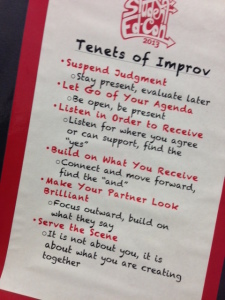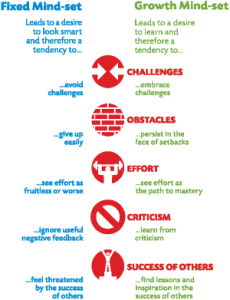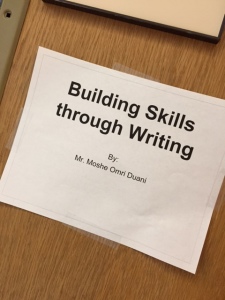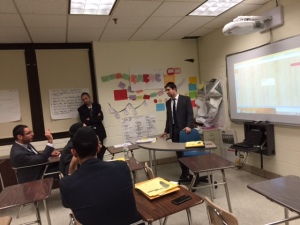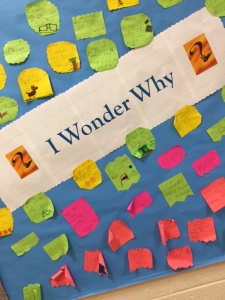Culture Change
I recently wrote about a road trip my colleagues at Magen David and I took to Northern California and how it reinforced the idea that a growth mindset is needed for real culture change to occur within a school. As I mentioned in the post, one of the ways the Los Altos school district fostered a growth mindset was by showcasing Tenets of Improv in teacher training rooms. I was impressed by these tenets when I read Tina Fey’s book Bossypants, in which she speaks about the power of coming from a “place of ‘yes'” and keeping an open mind. Here are some of Fey’s wise and witty observations:
1. You must agree. This doesn’t mean everyone has to get along, but it means you must agree on the given set of circumstances. For instance, if I say, “Wow, it’s great to be on the beach!” and you say, “We aren’t on the beach stupid, we are on the ski slope,” then the improv scene is dead. But if you say, “I can’t wait to get in the water, I hope it’s not too cold,” then we have a scene. We have agreed that this stage is now a sandy beach and we can keep moving forward.
I don’t recommend you agree with everyone in your life, but I challenge you to come from a place of “yes” and keep an open mind. Try to understand where others are coming from before discrediting them as “crazy” or “stupid.” “No” should be a last resort, and respect what others create.
2. “Yes” isn’t enough, you must “yes, and…” Add to the discussion. In the example above, the second person did not just say, “Yes we’re at the beach,” she said, “I can’t wait to get in the water, I hope it’s not too cold.” This statement adds value to the scene. Now the audience knows it’s cold and that we plan to enjoy the ocean as opposed to looking for gold or taking a yoga class.
To me, this rule challenges you to contribute. Whether you are developing an ad campaign or deciding where to eat dinner, put your neck out there, give your thoughts and have a say. Two minds are always better than one.
Developing an Inquiring Mind
In order to foster this growth mindset at Magen David, we recently held a professional development day where we shared some quotations from works that emphasize its importance. One of the works is Warren Berger’s A More Beautiful Question, which participants of the Summer Sandbox read and which challenges readers to develop an inquiring, curious mind. Here’s a thought-provoking statement from the book:
“In many cases, our Google queries are so unimaginative and predictable that Google can guess what we’re asking before we’re three words into typing it.”
Berger spends his book explaining the importance of developing the kind of mind that might outsmart a Google search:
“[T]he most creative, successful business leaders have tended to be expert questioners. They’re known to question the conventional wisdom of their industry, the fundamental practices of their company, even the validity of their own assumptions.”
“Inquiring minds can identify new opportunities and fresh possibilities before competitors become aware of them.”
“[T]hroughout his life Einstein saw curiosity as something ‘holy.’”
Many people are reluctant to change: they may have fixed notions about what societal structures look like or be fearful of the new and untried. Berger writes:
“[Q]uestions challenge authority and disrupt established structures, processes, and systems, forcing people to have to at least think about doing something differently. To encourage or even allow questioning is to cede power—not something that is done lightly in hierarchical companies or in government organizations, or even in classrooms, where a teacher must be willing to give up control to allow for more questioning.”
Berger stresses the importance of challenging the status quo:
“With the constant change we face today, we may be forced to spend less time on autopilot, more time in questioning mode . . . . In such times, the ability to ask big, meaningful, beautiful questions—and just as important, to know what to do with those questions once they’ve been raised—can be the first steps in moving beyond old habits and behaviors as we embrace the new.”
“A beautiful question [according to Warren Berger] is an ambitious yet actionable question that can begin to shift the way we perceive or think about something—and that might serve as a catalyst to bring about change.”
The Benefits of a Growth Mindset
Dividing the World into Learners and Nonlearners
Carol Dweck’s book Mindset is a logical companion to Berger’s, as Dweck’s research shows the potential people unleash within themselves when they embrace the kind of openness to growth and learning that Berger advocates for as well. Here are some salient points from Dweck’s book:
“I brought children one at a time to a room in their school, made them comfortable, and then gave them a series of puzzles to solve. The first ones were fairly easy, but the next ones were hard. . . . Confronted with the hard puzzles, one ten-year-old boy pulled up his chair, rubbed his hands together, smacked his lips and cried out, ‘I love a challenge!’ Another, sweating away on these puzzles, looked up with a pleased expression and said with authority, ‘You know, I was hoping this would be informative!’ . . . What did they know? They knew that human qualities, such as intellectual skills, could be cultivated through effort. And that’s what they were doing—getting smarter. Not only weren’t they discouraged by failure, they didn’t even think they were failing. They thought they were learning.”
“What are the consequences of thinking that your intelligence or personality is something you can develop, as opposed to something that is a fixed, deep-seated trait?”
“Alfred Binet wrote in his early-twentieth-century book Modern Ideas About Children, ‘A few modern philosophers . . . assert that an individual’s intelligence is a fixed quantity, a quantity which cannot be increased. We must protest and react against this brutal pessimism . . . . With practice, training, and above all, method, we manage to increase our attention, our memory, our judgment and literally to become more intelligent than we were before.’”
“Babies don’t worry about making mistakes or humiliating themselves. They walk, they fall, they get up. They just barge forward.”
“Benjamin Barber, an eminent sociologist, once said, ‘I don’t divide the world into the weak and the strong, or the successes and the failures . . . I divide the world into the learners and nonlearners.”
I find that last line to be quite powerful: How might we create schools where we’re not dividing students by academic standing or skill but rather focusing on making sure our students are learners? How might we create schools where everyone feels challenged to be a learner, to smack his lips, as the boy in the above story does, when presented with a difficult challenge?
Teachers as Learners
One of the ways to begin thinking about students as learners, instead of beings into which we download information, is to make ourselves — as educators — into constant learners. One of the biggest obstacles we face in doing so is, of course, a lack of time. Schools often don’t have enough professional development days in the school year and those days are often consumed with administrative trivia or the next big event on the horizon, but not on a macro-commitment to culture change. Schools invested in culture change have a conscious awareness of this problem and have come up with multiple solutions.
One is to hire personnel whose main task is teacher training. For example, I’ve been fortunate enough to connect over the past few months with several educators in charge of teaching and learning and curriculum development in their schools. We’ve been speaking on the phone about once a month and emailing questions and observations when we have them. These educators include Rabbi Avi Bossewitch, Dean of Academic Affairs at Hebrew Academy in Miami Beach; Rabbi Yehuda Chanales, Director of Curriculum and Instruction at Fuchs Mizrachi in Cleveland; Barry Ehrlich, Director of Curriculum and Instruction at Maimonides School in Boston; and more recently Melissa Perl, Director of Judaic Studies at Kohelet. The first thing we did when we all spoke was acknowledge and feel grateful for the commitment our schools have made to meaningful change by acknowledging that someone in the building has to own ongoing, meaningful professional development (PD).
A well-devised PD plan has, in fact, been one of Magen David’s goals this year. Having selected main areas of growth — skills development, edtech, creativity, and PBL — the school began the year with PD in those realms and has focused its monthly PD days on one or two of those initiatives. In fact, in early December, teachers presented to each other units or lessons that they had used to build student skills. What was great about the sessions was that they also incorporated the other initiatives the school has undertaken. For example, Jewish history teacher Frieda Cattan shared how her trimester of PBL honed many skills she wanted her students to develop. History teacher Joanne Auman showed how creative assignments such as clay map making (shown below) created an atmosphere of joyful learning and helped build student skills. Math chair and teacher Moshe Omri Duani shared how the school’s writing initiative helped his students sharpen skills, and Rabbi Michael Bitton, the school’s Director of Educational Technology, (surprise!) shared an edtech tool he used to sharpen skills in a Talmud class.
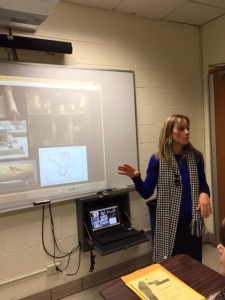
Students in Ms. Cattan’s class developed a myriad of higher order thinking skills through a PBL unit on the Return to Zion time period of Jewish history
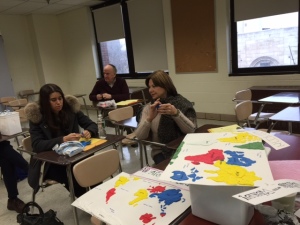
Students in Mrs. Auman’s Global Studies class made clay maps they will be sharing with visiting 8th graders in late December
Moving Forward
Creating a growth mindset is a key part of effecting the kind of culture change schools are aiming for today. It’s a crucial step, because I think it’s easy for an educator to feel overwhelmed by all the innovations happening in the field. It’s important for schools, then, to identify the areas of growth they really want to focus on: those areas should align with a school’s mission and vision and should be embedded clearly and consistently into an institution’s professional development plan for the year. In fact, everyone benefits when a school’s overarching goals are made clear to all stakeholders, and we’ll be writing more about that in upcoming posts.







